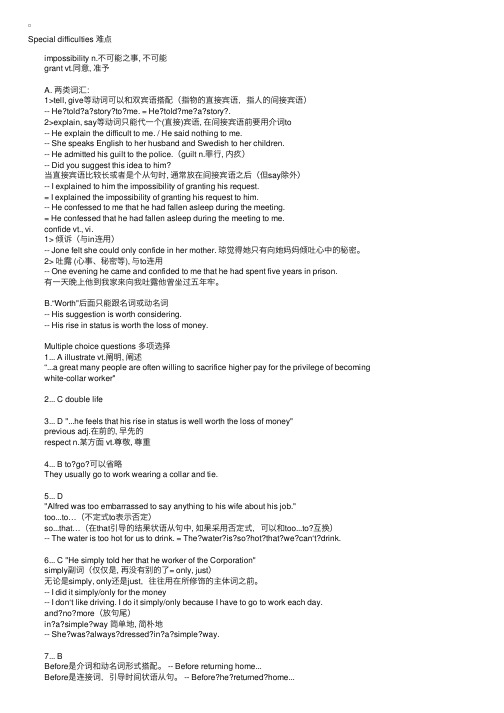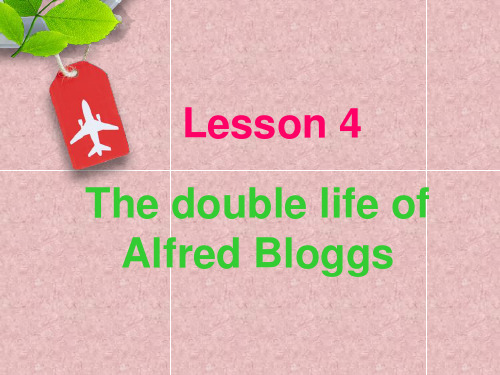新概念英语第三册第四课全文句子成分分析
新概念第三册Lesson 4 The double life of Alfred Bloggs讲义

新概念第三册Lesson 4 The double life of Alfred Bloggs一、单词精讲manual adj.体力的【释义】:与手有关的,需要用手操作的;主要依靠体力而非脑力的,与手工劳动相关的。
【词源】:源自拉丁语“manus”,表示手,加上“- al”形容词后缀,表示与手有关的,进而引申为体力的。
【短语】:manual labor(体力劳动);manual work(手工工作);manualskills(手工技能)。
【例句】:Manual jobs are often physically demanding.(体力工作通常对体力要求很高。
)collar n. 衣领【释义】:衣服围绕脖子的部分,通常用于装饰、保暖或固定衣服。
【词源】:源自古法语“colier”,再往前可追溯到拉丁语“collum”,表示脖子,衣领是围绕脖子的部分,所以得名。
【短语】:white collar(白领,指脑力劳动者);blue collar(蓝领,指体力劳动者);collar bone(锁骨)。
【例句】:The collar of his shirt was very dirty.(他衬衫的衣领非常脏。
)sacrifice v. 牺牲,献出【释义】:为了更重要的人、事、物或者某种信仰、理想等,放弃自己的利益、生命或其他有价值的东西。
【词源】:源自拉丁语“sacrificium”,由“sacer”(神圣的)和“ficere”(做)组成,原义是为了神圣的目的而做的事,通常包含奉献、牺牲的意思。
【短语】:sacrifice for(为...牺牲);sacrifice oneself(自我牺牲);sacrifice to(向...献祭;为...而牺牲)。
【例句】:Many soldiers sacrificed their lives for their country.(许多士兵为他们的国家牺牲了生命。
新东方新概念英语第三册笔记第4课(3):课后答案详解

Special difficulties 难点 impossibility n.不可能之事, 不可能 grant vt.同意, 准予 A. 两类词汇: 1>tell, give等动词可以和双宾语搭配(指物的直接宾语,指⼈的间接宾语) -- He?told?a?story?to?me. = He?told?me?a?story?. 2>explain, say等动词只能代⼀个(直接)宾语, 在间接宾语前要⽤介词to -- He explain the difficult to me. / He said nothing to me. -- She speaks English to her husband and Swedish to her children. -- He admitted his guilt to the police.(guilt n.罪⾏, 内疚) -- Did you suggest this idea to him? 当直接宾语⽐较长或者是个从句时, 通常放在间接宾语之后(但say除外) -- I explained to him the impossibility of granting his request. = I explained the impossibility of granting his request to him. -- He confessed to me that he had fallen asleep during the meeting. = He confessed that he had fallen asleep during the meeting to me. confide vt., vi. 1> 倾诉(与in连⽤) -- Jone felt she could only confide in her mother. 琼觉得她只有向她妈妈倾吐⼼中的秘密。
新概念英语第三册-Lesson_4_分析

3 sacrifice 牺牲:to give up for good purpose
▪ sacrifice...for [to] 为...而牺牲…, 牺牲...而换得... ▪ 他为拯救落水的孩子而献出自已的生命。 ▪ --He sacrificed his life to save the drowning
Lesson 4
The double life of Alfred Bloggs
▪ 1.manual =physical mental
▪ Adj. 体力的 Manual work mental work
▪
Manual worker
▪ Adj. 手动的 manual pump
▪ N. 手册 指南 instruction manual
child. ▪ --He sacrificed his life for the drowning child. ▪ 为国牺牲 ▪ Sacrifice one’s life for country ▪ N. 牺牲 --make sacrifices [a sacrifice] to为...作出牺牲
• 1 people who do manual work = • >blue-collar worker ,
• people who work in offices, people who do mental work=
• >white-collar worker • 2 far more money 多许多钱
workers 5. Which one earns more money now in your
opinion? Why? 6.Why are some people prepared to sacrifice to be
新概念英语第三册逐句精讲Lesson4~6

新概念英语第三册逐句精讲Lesson4~6 新概念英语第三册逐句精讲Lesson4新概念3课文内容:These days, people who do manual work often receive far more money than people who work in offices. People who work in offices are frequently referred to as’white collar workers’for the simple reason that they usually wear a collar and tie to go to work. Such is human nature, that a great many people are often willing to sacrifice higher pay for the privilege of becoming white collar workers. This can give rise to curious situations, as it did in the case of Alfred Bloggs who worked as a dustman for the Ellesmere Corporation. When he got married, Alf was too embarrassed to say anything to his wife about his job. He simply told her that he worked for the Corporation. Every morning, he left home dressed in a smart black suit. He then changed into overalls and spent the next eight hours as a dustman. Before returning home at night, he took a shower and changed back into his suit. Alf did this for over two years and his fellow dustmen kept his secret. AlF’swife has never discovered that she married a dustman and she never will, for Alf has just found another job. He will soon be working in an office. He will be earning only half as much as he used to, but he feels that his rise in status is well worth the loss of money. From now on, he will wear a suit all day and others will call him ‘Mr Bloggs’, not ‘Alf’.新概念英语3逐句精讲:1.These days, people who do manual work often receive far more money than people who work in offices.如今,从事体力劳动的人的收入一般要比坐办公室的人高出许多。
新概念第三册lesson 4

• v. vt. 牺牲,献出 n. 献祭,祭品;牺牲;献身 sacrifice one's life for the country make many sacrifices sacrifice time n.献祭,供奉,祭品;牺牲;献身 v. vt.献出,牺牲 make many sacrifices sacrifice one's life for the country
★sacrifice
• sacre-:神圣,宗教 • -ify:动词词缀 使... (I 服了you) • -ce 名词词缀
eg.sacre(神圣,宗教)+ ify(使..)=sacrify(使成为圣物,使献出 ,使牺牲) sacre(神圣)+ed(...的)=sacred(神圣的) eg.terr(恐怖分子)+ify=terrify(使恐怖,使害怕) class (级)+ify=classify(使分类) eg.sacrify(使牺牲)+ce(名词后缀)=sacrifice(牺牲) silent(安静的)+ce=silence(安静)
• She drives still more carefully than her husband.她开车比 她丈夫还认真。
2. People who work in offices are frequently referred to as “white-collar workers” for the simple reason that they usually wear a collar and tie to go to work. refer to...as = regard...as 把...看作为 I always refer to him as bookworm(书呆子). for the simple reason,for 引导的原因状语从句 for the reason that比because正式,因此多用于正式文体
新概念英语第三册重点句子及解析Lesson4

敲⿊板,划重点: 1.These days, people who do manual work often receive far more money than people who work in offices. 如今,从事体⼒劳动的⼈的收⼊⼀般要⽐坐办公室的⼈⾼出许多。
语⾔点1:句⼦结构分析:far more money than…是典型的⽐较结构。
⼀个who分别引导⼀个定语从句,分别修饰“两种不同类型”的⼯作⼈群。
语⾔点2:表⽰“当前,⽬前”的短语总结: These days 如今;at present ⽬前;at the present time ⽬前;currently 当今;nowadays ⽬前;for the moment⽬前;for the time being 时下;presently 时下。
2.People who work in offices are frequently referred to as'white collar workers' for the simple reason that they usually wear a collar and tie to go to work.坐办公室的⼈之所以常常被称作“⽩领⼯⼈”,就是因为他们通常是穿着硬领⽩衬衫,系着领带去上班。
语⾔点:句⼦结构分析:who引导定语从句,修饰people。
White-collar workers⽤引号括起,为借代修辞格。
That引导同位语从句,解释说明reason的内容。
3.Such is human nature, that a great many people are often willing to sacrifice higher pay for the privilege of becoming white collar workers. 许多⼈常常情愿放弃较⾼的薪⽔以换取做⽩领⼯⼈的殊荣,此乃⼈之常情。
新东方新概念英语第三册笔记第4课(2):课文讲解

新东方新概念英语第三册笔记第4课(2):课文讲解 Text 课文Why did Alf want a white-collar job?These days, people who do manual work often receive far more money than people whowork in offices.people who do manual work = blue-collar workerspeople who do mental work = white-collar workers = people who work in officesfor more money(far副词用来增强语气= much)People who work in offices are frequently referred to as "white-collar workers‘ for thesimple reason that they usually wear a collar and tie to go to work.refer?to...as?=?regard...as 把...看作为-- I?always?refer?to?him?as?bookworm(n.书呆子)for the simple reason = for? 引导的原因状语从句for?the?reason?that多用于正式文体,because多用于口语中。
-- He is refer to as a book worm for the simple reason that he spare no efforts reading.-- He was send to prison for he could not pay his debts.Such is human nature, that a great many people are often willing to sacrifice higher pay forthe privilege of becoming white-collar workers.human?nature 人性such...that... (that引导同位语从句, 进一步补充说明such 的基本内涵)-- His kindness was such that we will never forget him.= Such?was?his?kindness that… (such在句首要倒装)= He was so kind that we will never forget him.-- Such is human nature that we want to get a lot of things free.介词for表示一种目的be?willing?to?do?sth = be?ready?to?do?sth 心甘情愿做This can give rise to curious situations, as it did in the case of Alfred Bloggs who worked asa dustman for the Ellesmere Corporation.give?rise?to =(lead to v.导致, 通向)(cause vt.引起, 惹起)(result?in v.导致)-- Such conduct might give rise to misunderstandings. 这种行为会引起误解。
新概念英语第三册课堂学习笔记第4课TheDoubleLifeofAlfredBloggs

第⼀段词汇解析
①receive = get
②sacrifice = give up
③privilege = special advantage, honour
④give rise to = lead to, cause,引起、惹起
⑤curious = strange
⑥such 是形式主语, that引导主语从句作真正的主语
⑦in the case of ⾄于,就…⽽⾔, in case of(conj.)万⼀
⑧这⾥是关系代词 as 引导的定语从句,该从句中⼜含有 who 引导的定语从句
第⼆段词汇解析
①embarrassed = shy, be ashamed of。
②before 引导的时间状语从句, return 的逻辑主语与主句的 he 保持⼀致,所以原句=Before he returned home。
③discovered = found out
④she never will=she will never discover,省略句中, never 放到助动词之前。
⑤status = social position 地位,⾝份。
辨析: stature,⾝⾼、⽔平; statute,法令、法规;
Notes 学习笔记
词组归纳(第 4 课)
1.manual work
2.far more … than
3.human nature
4.be willing to do sth.
5.give rise to
6.in the case of
7.take a shower
8.keep one’s secret。
- 1、下载文档前请自行甄别文档内容的完整性,平台不提供额外的编辑、内容补充、找答案等附加服务。
- 2、"仅部分预览"的文档,不可在线预览部分如存在完整性等问题,可反馈申请退款(可完整预览的文档不适用该条件!)。
- 3、如文档侵犯您的权益,请联系客服反馈,我们会尽快为您处理(人工客服工作时间:9:00-18:30)。
These days, people who do manual work定语often receive far more money than people who work in offices定语. People who work in offices are frequently referred to as "white-collar workers' for the simple reason that they usually wear a collar and tie to go to work同位语.Such is human nature 倒装, that a great many people are often willing to sacrifice higher pay for the privilege of becoming white-collar workers同位语. This can give rise to curious situations, as it did in the case of Alfred Bloggs who worked as a dustman for the Ellesmere Corporation定语.
When he got married, Alf was too状语embarrassed to say anything to his wife about his job状语. He simply told her间接宾语that he worked for the Corporation直接宾语. Every morning, he left home dressed in a smart black suit状语. He then changed into overalls and spent the next eight hours as a dustman. Before returning home at night,he took a shower and changed back into his suit. Alf did this for over two定语years and his fellow dustmen kept his secret. Alf's wife has never discovered that
she married a dustman and she never will, for Alf has just found another job. He will soon be working in an office. He will be earning only half as much as he used to, but he feels that his rise in status主语is well worth the loss of money宾语. From now on, he will wear a suit all day and others will call him 'Mr. Bloggs', not 'Alf'.。
